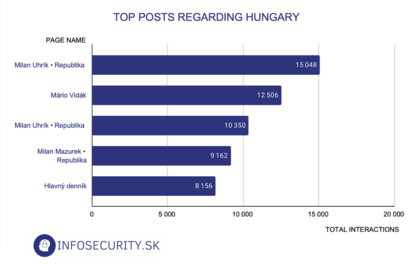DISINFORMATION
The European Union dubbed “authoritarian” by disinformation actors praising Hungary’s anti-EU stance

Infosecurity.sk presents an overview of disinformation trends that have been on the rise in information space in the past two weeks:
- Anti-western propaganda is trying to discredit and villainise the European Union. In particular, disinformers are pushing a narrative of „Brussel’s dictate“, regarding Slovak EU membership, which has been a focal point of anti-EU sentiment for years.
- Many pro-Russian and anti-EU politicians used the recent actions of Hungarian Prime Minister Viktor Orbán as an example of an admirable response to the EU’s „dictatorship“. Orbán's statements criticising the European Union and the financial aid provided to Ukraine are being massively shared on disinformation websites.
- Additionally, far-right politicians continue to spread hoaxes and false narratives about refugees crossing Slovak borders.
The European Union is being labelled authoritarian
In the past two weeks, the European Union has been a hot topic among disinformers and far-right politicians in Slovakia. Even though attacks against the West have been a stable occurrence among disinformation actors, we can see a clear trend of them gaining in intensity recently.
One of the most prominent actors spreading anti-EU narratives is Milan Uhrík, who is currently an MEP and the chairman of the far-right Republika party. In the past weeks, he has made several posts criticising the EU for various reasons.
On one instance, he posted a video of his speech in the European Parliament (EP) calling sanctions against Russia „bizarre“, as well as denouncing the European Commission stating that: „It speaks out on matters where it has no competence, such as the judiciary or family law. We do not want to be judged on the basis of a European idea of what is bad and what is good. Who is going to judge the EU?“ Spreading this narrative of lawlessness in the EU and claiming that the European Commission can do whatever it pleases is highly misleading. Article 17 of the Treaty of the European Union states that the EU Commission as a body is responsible to the European Parliament and the EP members have a full right to vote on a motion of censure of the Commission.
In another post, he goes on to criticise one of the proposals discussed in the EP and he expressively states: „The progressive steamroller wants to crush even the last vestiges of common sense. Brussels wants to strip democracy“. This falls within a broader Slovak context, in which many disinformation actors falsely depict progressivism, as well as liberalism, as the sole enemy of democracy, while simultaneously campaigning against it.
This narrative of „EU totalitarianism” is being further pushed by Eduard Chmelár, a former presidential candidate and a questionable political commentator who has repeatedly spread pro-Russian disinformation. In one of his posts, he says that „the new name for censorship in Brussels is ‘protecting consumers from harmful content’“ and proceeds to compare the present day to a socialist totality. Claims like these are highly problematic since the EU uses legitimate democratic mechanisms to implement legislation and no „dogmas“ can just be forcefully imposed on us.
Robert Fico, the former prime minister and a chairman of the SMER-SD party, posted a video criticising the EU sanctions against Russia and stating that they „won't work against Russia, but they will work properly against us“. The aim of these claims is to turn public opinion away from the West and undermine the EU’s decisions and actionability. Disinformation concerning sanctions has been a stable occurrence during the whole duration of the war in Ukraine and has been repeatedly debunked by many credible actors.
The actions of Hungary have gained massive support among disinformation actors
The anti-EU rhetoric has been further intensified by Hungarian prime minister Viktor Orbán’s decision to veto the financial aid package for Ukraine. In reaction, the EU threatened to freeze a sum of Hungary’s euro funds. This collision came after a long struggle over billions of euros of aid that have been frozen due to rule-of-law concerns, democratic backsliding and the possible mismanagement of EU resources in Hungary. In this dispute, many anti-Western actors in Slovakia were quick to take the side of Viktor Orbán.
Milan Mazurek, a member of the Slovak parliament under the Republika party, posted a video in which he states: „Hungary is allegedly violating the rule of law... The real reason is Hungary's conservative politics. Brussels and the liberals cannot stand it.“ The same approach to the situation was taken by Robert Fico, who posted a photo of him and the Hungarian minister of foreign affairs Péter Szijjártó, saying that „if we want common sense to return to Brussels“, partnerships and support are essential. During this meeting, Fico openly criticised sanctions against Russia and said that he would suspend the delivery of weapons to Ukraine if his party (SMER-SD) were to form a government. His strong pro-Russian and anti-EU views seem to resonate strongly with the Hungarian representatives and this kind of open support can be seen as a linking of nationalist tendencies, which in Slovakia "hides" under anti-system behaviour.
In addition to politicians, various disinformation media jumped to the issue. They are uncritically sharing the statements of Viktor Orbán and selectively choosing one-sided information, thus villainising the EU and Ukraine. In a broader context, Hungary with its firm anti-Ukrainian stance is seen as a role model for many pro-Russian disinformation actors and an inspiration for condemning EU policies.
Disinformers have adopted the rhetoric of Viktor Orbán
Since Viktor Orbán and Hungary in the context of the EU were one of the biggest topics in Slovak information space in the past two weeks, we also looked at it through an optic of a list of disinformation actors in Slovakia. We used the CrowdTangle analysis tool to analyse the most popular posts on Slovak Facebook that include the keyword „Hungary“ („Maďarsko“). Posts were evaluated based on the total number of interactions (the sum of all reactions, comments, and shares).
top5

The first place belongs to Milan Uhrík, who said in a post that since the EU Commission has blocked Hungary’s euro funds, Orbán must respond in „retaliation“. He also claimed that „the disintegration of the EU has just begun!“. This rhetoric fits into a broader scheme of narratives about the decadence of the West, specifically the long-present narrative of the EU's pointlessness and unnecessity. These are being spread with the intention to undermine the public’s opinion about the organization.
Mário Vidák, a hoaxer affiliated with Slovak far-right political parties, shared an article by disinformation media Plénum, which contains statements made by Viktor Orbán in reference to financial aid provided to Ukraine.
Milan Uhrík’s post criticising a proposal about the change of EU Founding treaties discussed in the European Parliament also favoured Hungary’s actions. Uhrík went on to say that he „hopes the Hungarian government blocks the proposal because we know the Slovak politicians will not do so.“
The fourth place belongs to Millan Mazurek and his aforementioned video claiming that the real reason behind the EU and Hungary dispute is the country’s conservative politics which the „liberals“ in Brussels do not approve of. Statements like these reduce the conflict down to an ideological struggle between "progressives Brussels" and the "conservative government" in Hungary, which completely ignores the complexity of the situation.
Lastly, disinformation media Hlavný denník posted an article adopting statements made by Viktor Orbán and favouring the Hungarian government. This can be considered a prime example of uncritical and manipulative content by pro-Russian alternative media produced in Slovakia.
Immigration as a thorn in the eye of far-right politicians
Refugees fleeing war-affected areas that are crossing the Slovak borders still spark huge waves of disinformation, especially from actors that try to score political points and further their own agenda. One of the biggest topics among these disinformers was an out-of-context announcement that the Slovak government is planning to build another tent city for immigrants (in addition to the one in Kúty).
The main actors spreading this disinformation were politicians from far-right parties such as Republika or Kotlebovci-ĽSNS. Marian Kotleba, who is a chairman of the latter, posted a video, which has since accumulated over 120 thousand views. In it, he states that „our politicians are preparing another immigration camp. Just as the Covid measures only worked because there were sell-outs who demanded tests for money or bullied people, the conditions for immigrants in Slovakia do not create themselves,“ suggesting that the Slovak government is somehow responsible for the waves of immigrants arriving in Slovakia.
Milan Mazurek also posted a video attacking the Slovak government for „flooding the country with illegal immigrants“, and blaming them for treating the refugees better than their own citizens. Deliberate misleading of the Slovak citizens regarding illegal immigration is meant to incite hatred and induce fear stemming from cultural differences, which exploits the current uncertain situation present in Slovakia.
This disinformation has since been debunked by the official account of the Slovak police Hoaxy a podvody - Polícia SR (Hoaxes and scams - Police SR). The Ministry of the Interior of the Slovak Republic does not plan to build any more tent cities for illegal migrants and at present, only a survey of options is being carried out in case another wave of illegal migrants arrives after the winter months. The Slovak police also condemned the false narratives that are spreading on social media and stated that the topic of illegal migration is once again being exploited by dubious individuals for political propaganda in an attempt to polarise society.
Project Infosecurity.sk organized by Adapt Institute, which is supported by the Prague office of the Friedrich Naumann Foundation for Freedom, continuously monitors the activities of both Slovak and foreign disinformation actors, but focuses mainly on the former. The project activities are built upon daily monitoring of emerging disinformation, hoaxes, and conspiracy theories in the online information space. This approach allows the analysts to identify disinformation posts and narratives that resonated with the public the most, as well as to find out where they originated, and how they spread and evolved on social media. The report takes the form of a bi-weekly summary of arising trends in the spread of malicious information content online. Based on that, Infosecurity.sk can warn the public about emerging and current trends in the field of disinformation, manipulation, and propaganda.

